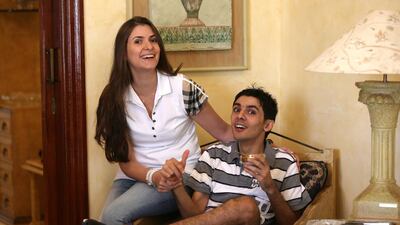Majd Madi spends most of his days at home with nothing to do.
For a change of scenery, Mr Madi, 21, goes to the neighbouring Safa Park or a fast-food restaurant.
He is among many autistic adults who are leaving special-needs centres with little hope of a productive future.
“The problem is most centres are making the mistake of not thinking beyond their finger,” said Mr Madi’s mother, Wafaa. “They are only thinking of the present, and that’s what happened with us. Even the ones they are taking now, they are going to reach my situation.”
Mrs Madi and her husband are making every effort to keep their son happy, but this does not come without its challenges. Acknowledging her son’s limitations, Mrs Madi said this should not be an excuse to exclude children with special needs from the community.
“They still have talent and potential, and that’s why centres that are going to open and expand need to have workshops. For example, crafts they can make and sell for charity.”
Experts are in strong agreement that there is lack of a support system to help autistic adults adapt into the community once they leave the centres, emphasising that the problem lies at the grassroots level.
“We have gaps from two ends,” said Dr Bushra Al Mulla, director of the Dubai Early Childhood Development Centre.
“First is the lack of early intervention and inclusion. Currently, only a lucky few get enrolled in one of the centres and successfully merge into mainstream school. And those who do, at a certain age, the school can no longer accommodate them because the staff are not equipped to handle these cases.
“So students either get expelled or graduate without a certificate.”
The second gap, Dr Al Mulla said, was a lack of vocational programmes for special-needs students at all levels.
“That way, if students don’t graduate with a certificate, they at least receive something equivalent so they can either get employed or enrol in a university,” she said.
The centre, which belongs to the Community Development Authority, serves Emiratis with various developmental disorders. It has a capacity of 52 children, half of whom are autistic. There are another 130 on the waiting list.
The authority also offers a separate employment programme for people with special needs, with individual skills matched to available jobs.
The Abu Dhabi Autism Centre, a part of the Zayed Higher Organisation for Humanitarian Care and Special Needs, operates similarly and also offers training. But that centre is also at capacity, with 43 children. Expansion plans include opening a new unit that will accommodate 120 children by 2015. The new centre will have workshops where adults can apply their skills in various fields, such as carpentry, agriculture or technology.
The lack of programmes is not specific to autistic children, but special-needs children in general, said Dr Hibah Shata, managing director and co-founder of the Child Early Intervention Medical Centre.
“How can you accommodate the increasing number over time if you already have full and long waiting lists at every centre?” she said. “The only solution is to include them in mainstream schools and work with them according to their skills and abilities.”
Although federal law grants general right to and prohibits discrimination against people with disabilities, policy has yet to be implemented on the ground, with many schools rejecting entry on the basis of lack of space or resources.
“I always hear from parents that teachers feel these students are imposed upon them, a burden,” Dr Shata said. “This attitude needs to change. There needs to be the concept that this is the child’s right, that they are equal to all other children – different, but not less. And this is what we need to advocate.”
Most children with developmental disorders can make progress with early diagnosis and intervention.
“We are talking about adults today who did not have an opportunity to go to school and did not have an academic programme at their rehabilitation centre,” she said. “If they do end up in school, then we need to support them so they can go to college, and only then can they have a future.”
For the moment, the smile on Majd’s face is enough to give Mrs Madi her hard-earned peace of mind. But it is the future that scares her the most.
“I don’t know if it’s funny or weird. Usually you always pray for others to live a long life,” she said. “But in my case, I also pray for myself so I can always be around for Majd. I pray for the longest I can stay in good health and strength, for him.”
newsdesk@thenational.ae

